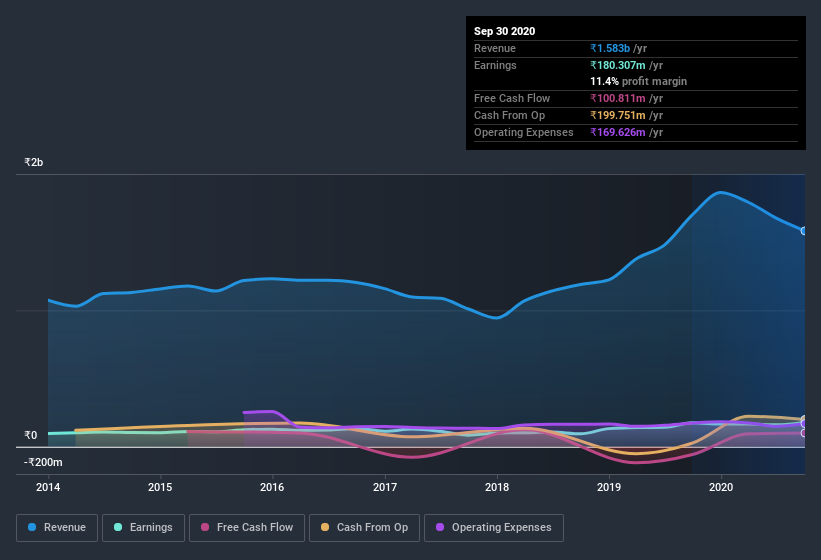Does Mazda's (NSE:MAZDA) Statutory Profit Adequately Reflect Its Underlying Profit?

Many investors consider it preferable to invest in profitable companies over unprofitable ones, because profitability suggests a business is sustainable. That said, the current statutory profit is not always a good guide to a company's underlying profitability. This article will consider whether Mazda's (NSE:MAZDA) statutory profits are a good guide to its underlying earnings.
It's good to see that over the last twelve months Mazda made a profit of ₹180.3m on revenue of ₹1.58b. In the chart below, you can see that its profit and revenue have both grown over the last three years, although its revenue has slipped in the last twelve months.
See our latest analysis for Mazda

Not all profits are equal, and we can learn more about the nature of a company's past profitability by diving deeper into the financial statements. In this article we'll look at how Mazda is impacting shareholders by issuing new shares. Note: we always recommend investors check balance sheet strength. Click here to be taken to our balance sheet analysis of Mazda.
In order to understand the potential for per share returns, it is essential to consider how much a company is diluting shareholders. As it happens, Mazda issued 6.3% more new shares over the last year. That means its earnings are split among a greater number of shares. To celebrate net income while ignoring dilution is like rejoicing because you have a single slice of a larger pizza, but ignoring the fact that the pizza is now cut into many more slices. Check out Mazda's historical EPS growth by clicking on this link.
How Is Dilution Impacting Mazda's Earnings Per Share? (EPS)
As you can see above, Mazda has been growing its net income over the last few years, with an annualized gain of 112% over three years. And in the last year the company managed to bump profit up by 2.9%. On the other hand, earnings per share are only up 6.0% in that time. So you can see that the dilution has had a bit of an impact on shareholders. Therefore, the dilution is having a noteworthy influence on shareholder returns. And so, you can see quite clearly that dilution is influencing shareholder earnings.
In the long term, earnings per share growth should beget share price growth. So it will certainly be a positive for shareholders if Mazda can grow EPS persistently. But on the other hand, we'd be far less excited to learn profit (but not EPS) was improving. For the ordinary retail shareholder, EPS is a great measure to check your hypothetical "share" of the company's profit.
Our Take On Mazda's Profit Performance
Each Mazda share now gets a meaningfully smaller slice of its overall profit, due to dilution of existing shareholders. Because of this, we think that it may be that Mazda's statutory profits are better than its underlying earnings power. But the good news is that its EPS growth over the last three years has been very impressive. At the end of the day, it's essential to consider more than just the factors above, if you want to understand the company properly. With this in mind, we wouldn't consider investing in a stock unless we had a thorough understanding of the risks. You'd be interested to know, that we found 4 warning signs for Mazda and you'll want to know about these bad boys.
This note has only looked at a single factor that sheds light on the nature of Mazda's profit. But there is always more to discover if you are capable of focussing your mind on minutiae. For example, many people consider a high return on equity as an indication of favorable business economics, while others like to 'follow the money' and search out stocks that insiders are buying. So you may wish to see this free collection of companies boasting high return on equity, or this list of stocks that insiders are buying.
If you decide to trade Mazda, use the lowest-cost* platform that is rated #1 Overall by Barron’s, Interactive Brokers. Trade stocks, options, futures, forex, bonds and funds on 135 markets, all from a single integrated account. Promoted
If you're looking to trade Mazda, open an account with the lowest-cost platform trusted by professionals, Interactive Brokers.
With clients in over 200 countries and territories, and access to 160 markets, IBKR lets you trade stocks, options, futures, forex, bonds and funds from a single integrated account.
Enjoy no hidden fees, no account minimums, and FX conversion rates as low as 0.03%, far better than what most brokers offer.
Sponsored ContentNew: Manage All Your Stock Portfolios in One Place
We've created the ultimate portfolio companion for stock investors, and it's free.
• Connect an unlimited number of Portfolios and see your total in one currency
• Be alerted to new Warning Signs or Risks via email or mobile
• Track the Fair Value of your stocks
This article by Simply Wall St is general in nature. It does not constitute a recommendation to buy or sell any stock, and does not take account of your objectives, or your financial situation. We aim to bring you long-term focused analysis driven by fundamental data. Note that our analysis may not factor in the latest price-sensitive company announcements or qualitative material. Simply Wall St has no position in any stocks mentioned.
*Interactive Brokers Rated Lowest Cost Broker by StockBrokers.com Annual Online Review 2020
Have feedback on this article? Concerned about the content? Get in touch with us directly. Alternatively, email editorial-team@simplywallst.com.
About NSEI:MAZDA
Mazda
Engages in the manufacturing of engineering goods in India and internationally.
Flawless balance sheet average dividend payer.
Similar Companies
Market Insights
Community Narratives




